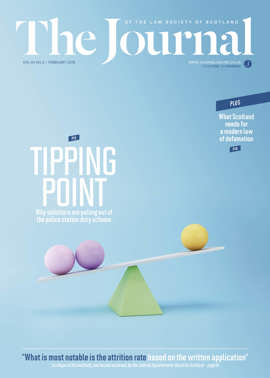Defamation law for the digital age

In today’s society the law of defamation has assumed increasing importance for many of us: the media, publishers, broadcasters, writers, journalists, politicians, the legal profession, technology companies, and the public – especially as users of the internet and social media.
However, Scots law on defamation is badly in need of reform so that it is fit for the age of modern mass communication. Most of the current law was developed by judicial decisions in the 19th and early 20th centuries – the most prolific period for defamation actions in Scotland. The principles and rules established in that bygone era now need to be modernised. The law has become increasingly antiquated, inaccessible and difficult to advise on.
An ambitious undertaking
In December 2017 the Scottish Law Commission published its Report on Defamation (Scot Law Com No 248), together with a draft bill which aims to put defamation law in Scotland onto a modern footing. This is the most ambitious and far-reaching attempt to reform defamation law in Scottish legal history. In all we make 49 recommendations; they are based on comparative legal analysis and extensive consultation (both on our earlier Discussion Paper on Defamation (Discussion Paper No 161) and on a working draft of the bill).
If enacted, our proposals have the potential to reinvigorate this area of the law to make it fit for purpose. Most of the key principles will be set out in a modern, accessible statute. Practitioners and the public will no longer have to search for the law across a complex landscape of elderly and sometimes inconsistent case law and scattered statutory provisions.
Balancing fundamental rights
Defamation law must strike the right balance between two fundamental rights that sometimes pull in opposing directions: freedom of expression and protection of reputation. We value freedom of speech, but at the same time want to ensure that reputations are protected from being falsely smeared. The law of defamation has a pivotal part to play in safeguarding both these rights. It is important that independent journalism can thrive so that powerful interests are properly held to account; at the same time the law must allow those who are falsely accused of wrongdoing to restore their reputations swiftly and at reasonable cost, if necessary through the courts.
Why a serious harm test?
One of the key recommendations in our report is that where a statement has not caused serious harm to reputation, there should be no right to sue. This has been the position in England & Wales since the Defamation Act 2013. Most of the respondents to our consultation supported the introduction of such a provision in Scotland. They pointed to evidence that the new threshold test in the 2013 Act has worked well; it has incentivised the prompt correction of defamatory statements and has not proved to be an unfair obstacle to justice.
Having considered the issue carefully, we concluded that there should be no right to bring defamation proceedings unless serious harm to reputation has been caused or is likely to be caused (or “serious financial loss” in the case of non-natural persons primarily trading for profit). We believe it is important to prevent defamation actions (or the threat of such actions) being used as a weapon to try to silence unwelcome but justified criticism. The introduction of a serious harm threshold will allow the courts to strike out trivial or vexatious claims at an early stage. The test adds usefully to the emerging notion of an abuse of process jurisdiction in the Scottish courts. We think that the serious harm test will serve to promote freedom of expression. It is difficult to see a justification for allowing claimants to sue for damage to reputation that is less than serious.
We do not believe that the introduction of such a test in Scotland will have the effect of driving defamation actions south of the border, as some have suggested. In this connection it is interesting to note that a High Court judge in England recently held that Scotland was the more appropriate forum for a defamation action raised in London, and in doing so commended our “highly respected judicial system” (see Kennedy v National Trust for Scotland [2017] EWHC 3368 (QB), at para 79). As Campbell Deane acknowledged in his article opposing this proposal (Opinion, Journal, October 2017), the cost of litigation is considerably lower in Scotland than in London. The Scottish Government’s recent proposal to allow solicitors to enter into damages-based feeing agreements in civil litigation may assist in this connection (see the Civil Litigation (Expenses and Group Proceedings) (Scotland) Bill). The Scottish courts will be able to consider and take account of English case law in deciding how to apply the serious harm test in practice. In England & Wales, the Court of Appeal recently made clear in the case of Lachaux v AOL (UK) Ltd [2017] EWCA 1334 that expensive and elaborate preliminary procedure on the question of serious harm was not necessary; the issue would usually be capable of being decided on a pragmatic basis by a process of inference based on an analysis of the statement complained of. In most cases, it will be straightforward to decide whether a statement has caused or is likely to cause serious harm to reputation. Access to justice will not be impaired.
Our recommendations for reform
Elsewhere in our report we recommend that some old rules of Scots law should be swept away. For example, we think it should no longer be possible to sue where a defamatory statement is made only to the person who is the subject of it – in that case there cannot realistically be any damage to reputation.
We also recommend that Scots law should explicitly recognise a defence of publication on a matter of public interest. This is important for investigative journalism. There have been few cases on this issue in the Scottish courts. We consider that there is much to be gained, in terms of clarity and accessibility, by having the principle set out in a modern statutory provision.
Under the present law a person can allow three years to elapse before suing for defamation. We think this is too long. Where there has been genuine damage to reputation this should become clear quickly. So, we recommend that the three-year time limit should be reduced to one year.
We also propose that there should be a new “single publication” rule; this means that the time limit for bringing a claim will not start afresh each time the same statement is downloaded by a new search on the internet.
As far as the liability of internet intermediaries (such as search engines and operators of web pages and social media sites) is concerned, the ideal solution would be a UK-wide review of the law in the light of technological developments: the internet does not recognise national borders, and information flows freely across jurisdictions. In the meantime, our aim is to ensure that the Scottish courts have the right tools effectively to tackle defamation on the internet. Our consultation showed that what most claimants want is to have defamatory material quickly taken down. We believe that the law should make this its priority and move away from strained and artificial reliance on outmoded concepts developed more than 100 years ago, such as the idea that everyone who repeats a statement should automatically be regarded as a new publisher of the statement.
We therefore recommend that it should be possible to bring proceedings only against the original author, editor or publisher of a statement and not against secondary publishers. The courts should, however, have stronger and clearer powers to order the removal of defamatory material from the internet, and they should be empowered to make such orders quickly where the circumstances justify this. We recommend that such “take-down” orders should be available against persons who are not parties to the proceedings. To some, these proposals may seem radical, but we believe that the law must be reconfigured so that it is workable in modern conditions.
The report recommends many other reforms including:
- restating in modern terms the main defences to a defamation claim, such as the key defence of fair comment and the defence of truth;
- making clear that public authorities cannot bring defamation cases;
- removing the presumption in favour of jury trial and instead conferring on the courts a discretionary power to order the type of hearing best suited to the case: this will promote efficient management of litigation and the early resolution of key issues;
- restating the law on the offer of amends procedure: this can lead to early resolution
- of claims;
- modernising the law governing absolute and qualified privilege;
- providing that an action can only be brought in Scotland where this country is clearly the most appropriate place for proceedings;
- replacing common law verbal injuries with new statutory wrongs relating to certain types of malicious publications;
- strengthening the range of remedies available to the courts by giving them power to order that the defender must publish a summary of the court’s judgment, to allow settlement statements to be read out in open court, and to order operators of websites and others to remove defamatory material over which they have control.
Next steps
It is now up to the Scottish Government to decide whether to implement the recommendations in our report by pursuing legislation in the Scottish Parliament. By doing so it will put Scots law on a modern footing and on a par with best international practice.
In this issue
- Enforceable rights or progressive policy goals?
- Data processors beware: GDPR holds you responsible too
- Insolvency in a post-Carillion world
- Employee ownership: a strategy that fits
- A mediation Act? The Irish experience
- Journal magazine index 2017
- Reading for pleasure
- Opinion: Andrew Tickell
- Book reviews
- Profile
- President's column
- Digital progress given go ahead
- People on the move
- Tipping point for legal aid?
- Arrest: all change
- Legal software: are you still listening to Gangnam style?
- Defamation law for the digital age
- Choosing our judges: could we do it better?
- A journey through trust compliance
- The Cashroom: 10 years of service
- From dockets to defences
- Sex discrimination runs deep
- Wealth not a bar to s 28 claims
- No spying on the job
- Scottish Solicitors Staff Pension Fund: not the final instalment?
- Scottish Solicitors' Discipline Tribunal
- The Clark Foundation for Legal Education
- LBTT's birthday alert
- Doing all the white stuff
- Solicitor's CBE for life of service
- From the Brussels office
- Paralegal pointers
- Public policy highlights
- The kindest cut
- Wish list for the review
- Benchmarking: take the benefits
- Tax evasion: don't get caught up
- Ask Ash
- Time to call out harassment
- Q & A corner






